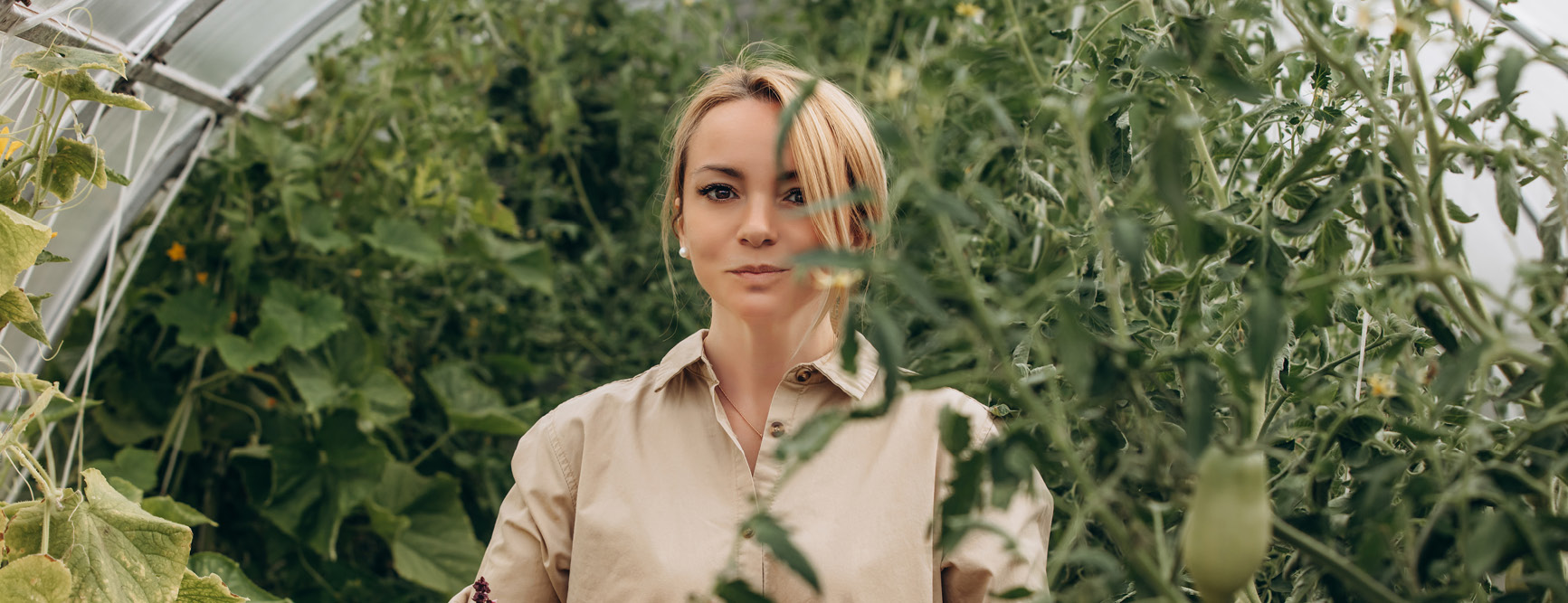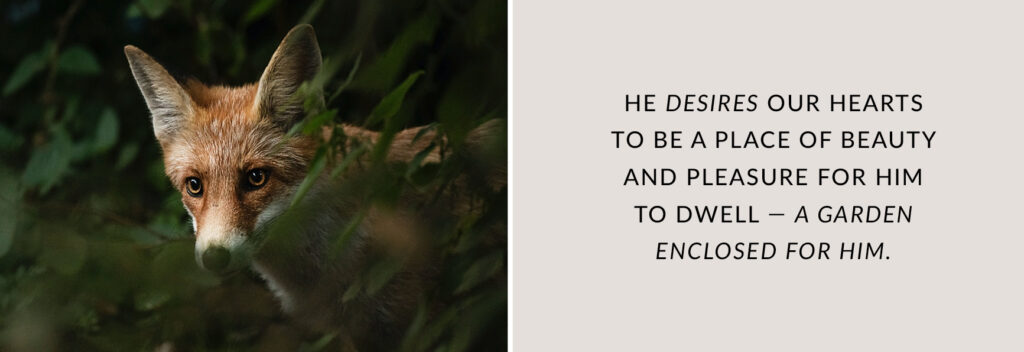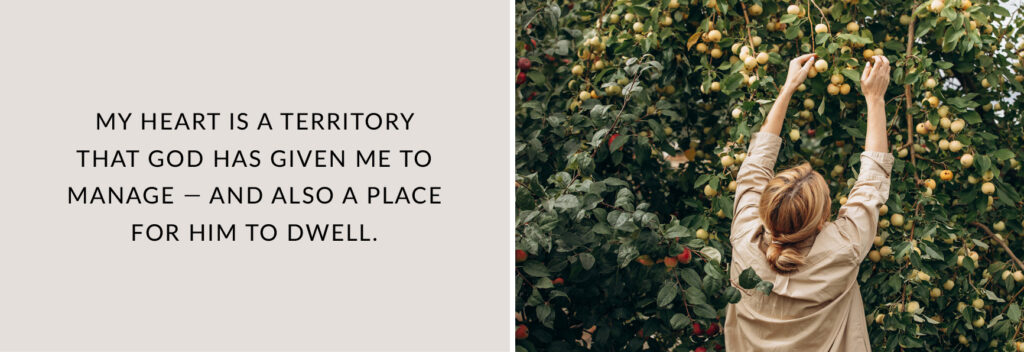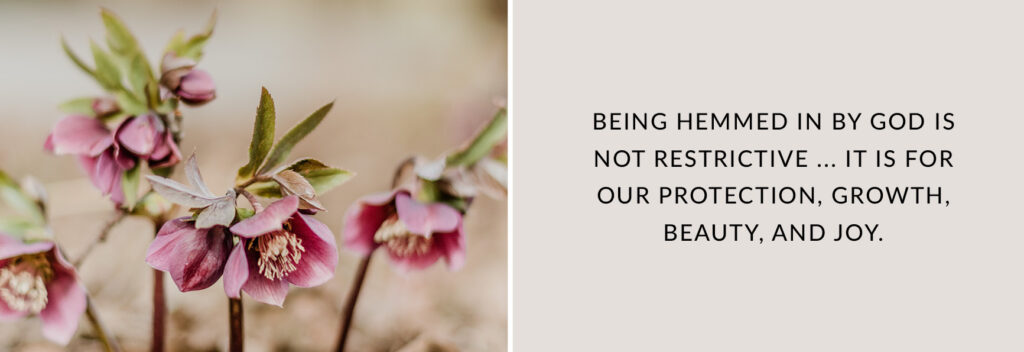Hemmed in for Fullness and Fruitfulness
By Mandy Saeler

In a split second, my lively pace came to a halt when I heard a bloodcurdling shriek come from the valley to my right. The cool air of the early morning stood still as I looked around with wide eyes and paused to listen. Hearing a rustling, I studied the nearby brush where I spotted the movement of camouflaged fur. After pausing for a few moments and without noting any further signs of distress, I cautiously resumed my stride when another scream burst from the woods. This time the sound came directly toward me from the brush.
Turning on my heels and high-tailing it back to an open field, I finished my morning walk by taking the long way home. I glanced over my shoulder from time to time, my accelerated heart rate pounding as my curious imagination ran in circles wondering what I’d just encountered. What was that? A raccoon? A bobcat? A fox?
A few weeks later, I saw a fox skulking by the pond one evening. Since that time, the absence of the usual geese in the pond, a disturbed nest with unhatched eggs found nearby, as well as various other fox sightings and bloodcurdling screams in the night have all been observed. I am now certain that the scream in the woods that early morning was a fox — probably a momma fox protecting her young from a blonde, speed-walking invader amid the flora and fauna.
In light of these recent fox evidences around my home, I’ve been seeing foxes in various forms — from home decor and artwork pieces, to baby toys and greeting cards. Foxes have been seemingly everywhere for me, and lately my mind has wandered to the mention of foxes in Scripture. Specifically, in the Song of Solomon, when the brothers of the Shulamite woman make this call to arms: “Catch us the foxes, the little foxes that spoil the vines, for our vines have tender grapes” (2:15). As you and I well know, foxes are sly by reputation. And from this Scripture we also gather that they are known to rob fruitfulness and life — though small creatures, they can cause great harm to the harvest.
The Symbolic picture
As a whole, the Song of Solomon is widely recognized as an allegorical representation of Christ and His bride, the Church. Throughout the book of the Song of Solomon, the bridegroom extols and exclaims the many virtues and beauties of his beloved woman. Everything from her humility to her cascading tresses delights his heart as he exclaims, “You are all fair, my love, and there is no spot in you” (4:7). In this same passage, he closes his exclamations of adoration and affection with the likening of his beloved to “a garden enclosed” filled with trees, plants, fruit, and spices (vs.12–14).
What a beautiful picture for us as believers to embrace, recognizing that this is our portion in Christ! Wrapped in the righteousness of Christ, God looks upon us and sees gleaming beauty and purity without the tarnish of sin. And our “garden enclosed,” the inner territory of our hearts (so to speak), is now intended for fullness, fruitfulness, and abundant potential for exponential life.
In response to the bridegroom’s loving exposition, the well-loved woman replies, “Awake, O north wind, and come, O south! Blow upon my garden, that its spices may flow out. Let my beloved come to his garden and eat its pleasant fruits” (4:16).
What a stunning posture of heart we can observe in this woman! Her surrender, desire for the movement of the wind, and warm welcome toward her beloved are a picture of what the sacred space of our “garden enclosed” should be for our God. Surrendered before Him, as the wind of the Holy Spirit moves within us and upon our “garden,” we emanate the fragrance of Heaven to the world around us. This is our desire, and we beckon His movement and power to carry forth His sweetness and strength into the world around us through our yielded lives. And above all, this beautiful garden of our hearts is to be a place that welcomes the presence of our God; a pleasing place for Him to dwell and be delighted by the growth of goodness.
I don’t know about you, but my heart is stirred by this amazing picture of love and communion with our God. It’s amazing to me that He desires our hearts to be a place of beauty and pleasure for Him to dwell — a garden enclosed for Him.

My Garden and His garden
When I gave my life to Christ as a young woman and became serious about my devotion to Christ, I grew to recognize that my heart was a territory that God had given me to manage — and also a place for Him to dwell. This sacred space of my heart was my garden — and yet it was to be His garden, just as the Shulamite woman acknowledged, “Blow upon my garden … Let my beloved come to his garden and eat its pleasant fruits” (4:16, emphasis added).
As I surrendered to God and to His leading in my life, my heart was tender with conviction and repentance. I also became very aware of the words that would come out of my mouth, recognizing that they flowed directly from my heart — and there were times when what was revealed to be in my heart grieved me. I also began to see how the things and people I allowed to “input” into my life influenced my thoughts, attitudes, words, actions, and the very climate of my heart. For better or for worse, my life would later reap the fruit of the seed from whoever or whatever I allowed to be sown into the garden of my heart. And so, I became intentionally selective about what I allowed into the territory of my heart through entertainment, news sources, social media, and even friendships.
Each day my perspective seemed to change more and more as I knew that God was leading me to become territorial about the garden of my heart. But I learned that guarding my heart would be wrought first in surrender to the Lord. He was to be the enclosure about my garden — my fortress, my refuge, and my hiding place. And yet, in the daily workings of my life, I also had a responsibility to tend to my garden — both in what was ruthlessly removed and in what was intentionally cultivated.
My decision to be more protective of the purity of my heart and life was a response to God’s conviction and was rooted in my growing devotion to Him. I clearly understood that my right standing before God came from Christ alone. And it was out of love for Him that I desperately wanted to tend carefully to the territory of my soul that He’d given His very life to redeem and restore. I recognized that there were many “little foxes” skulking about that would rob the blossoms on the vines bare if I wasn’t watchful of the influences, distractions, and dangers that lay in wait at the door of my heart each day.
This season of my life became dedicated to a heartfelt heeding of the guardrails I observed in Scripture. Day by day I learned to guard my heart, ponder the path of my feet, delight in the law of the Lord, yield to His refining, and fix my focus on things that were pleasing to Him. Scripture passages like Psalm 1, Proverbs 4, Matthew 15:10–20, and Philippians 4:4–9 became the theme of that time in my life.
As time has passed and my age has doubled since that formative season, familiar paths have been laid in the garden of my heart. The young vines that were planted all those years ago have grown, and this well-practiced and thoughtful way of living has become natural. I treasure the simplicity that marks and guards my life. I continue to be so grateful for how God led me in that delicate season of my spiritual formation. And yet, even amid that familiarity within these garden walls, there are times when I am alerted to encroaching little foxes that would sneak in and spoil my garden.
The “little foxes” have taken on different forms throughout the varying stages of my spiritual growth and maturity. Early in my walk with Christ, I would have identified the “little foxes” as influences through relationships or entertainment that didn’t align with my spiritual values. At this point in my life, while those “little foxes” still exist, it’s more likely that their stealth comes in a different form. It might be retracting in the fear of man, neglecting to approach the challenges of life with a faith-filled perspective, or giving way to the rule of emotion. And oh, how swiftly those “little foxes” snatch the fruit on the vine! Perhaps for each of us, the “little foxes” set to assail our gardens may vary — but all the same we are called to be watchful and to take the “little foxes” captive.

A garden enclosed
When was the last time you esteemed the territory of your heart as a garden enclosed? As a beautiful, pleasant, and intentional place that is intended for fullness and fruitfulness — and yet is also to be proactively guarded, protected, and preserved?
If the seeds sown into our garden were the things we gave our time, attention, and the focus of our hearts to — what would grow in our garden? Are our vines blossoming with the goodness of the God-harvest? Or are they weathered, dry, and barren?
What would happen if we embraced this reality that our hearts are to be a pleasing dwelling place for the Lord? What difference or change should this make in our lives?
I would encourage you to spend some time prayerfully journaling in response to the questions on the following pages, and any other questions or cautions that the Lord raises in your heart. Personally, I always find it beneficial to slip away from the busyness of life and really reflect with God on what is growing in the garden of my heart. I hope you will, too.* And by God’s grace, may we each be quickened to catch the little foxes before they spoil the vines.
Hemmed in for fullness and fruitfulness
God’s intent for us as a “garden enclosed” is that we would be hemmed in for an abundance of heavenly, eternal good. His purpose and pattern for us is vibrancy of spirit and the overflow of His goodness to the world around us. Being hemmed in by God is not restrictive, strangling, unduly limiting, or life-draining. It is for our blessing, protection, growth, beauty, and joy. As a garden enclosed, we are hemmed in for fullness and fruitfulness.
May the garden of our hearts be such a place for our Lord. The foxes will scream — but may they sound from the outside of our enclosed garden, where our blooming vines dwell in safety and a harvest of blessing is brought forth for the glory of our God.

This article was originally published in Issue 40.
For more content, explore our article collection.